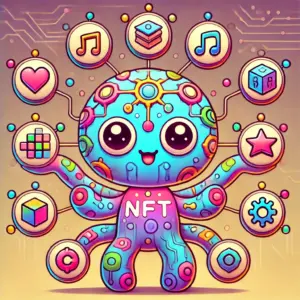Since their emergence in 2017, non-fungible tokens (NFTs) have captured the attention of the world, revolutionizing the way we perceive and interact with digital assets. While NFTs offer a plethora of possibilities for creators, collectors, and businesses, their environmental impact has raised concerns among environmentalists and sustainability advocates.
The Energy Consumption of Proof-of-Work Blockchains
The primary reason for the environmental concerns surrounding NFTs lies in the energy-intensive nature of the blockchain technology that underpins them. Most NFTs are built on the Ethereum blockchain, which utilizes a consensus mechanism called proof-of-work (PoW). In PoW, miners compete to solve complex cryptographic puzzles to validate transactions and add new blocks to the blockchain. This process requires significant computational power, consuming vast amounts of electricity that often comes from fossil fuels, leading to carbon emissions.
A 2021 study by the University of Cambridge estimated that Ethereum’s annual energy consumption is equivalent to the power usage of a medium-sized country, such as Jordan or Thailand.[1] This energy consumption is primarily attributed to the use of specialized hardware called mining rigs, which consume massive amounts of electricity to solve PoW puzzles.
The Impact on Climate Change
The carbon emissions associated with NFTs directly contribute to climate change, a pressing global issue that poses significant risks to the environment and human well-being. According to the International Energy Agency, the energy sector is responsible for over 70% of global greenhouse gas emissions, and the growth of the digital economy, including blockchain technology, could exacerbate this issue.
Environmental Concerns Beyond Carbon Emissions
The environmental impact of NFTs extends beyond carbon emissions to encompass other environmental concerns. The mining process for PoW blockchains, such as Ethereum, consumes vast amounts of water, which can strain local water resources and contribute to water scarcity in some regions. Additionally, the manufacturing and disposal of mining equipment also generate environmental waste.
Alternative Blockchain Technologies with Lower Environmental Impact
In response to the growing concerns about the environmental impact of PoW blockchains, alternative consensus mechanisms are being developed that aim to reduce energy consumption and carbon emissions. One such mechanism is proof-of-stake (PoS), which does not require miners to compete for computational power. Instead, participants validate transactions by locking up a certain amount of cryptocurrency as a stake.
NFT Platforms and Initiatives for Environmental Sustainability
Recognizing the environmental concerns surrounding NFTs, several platforms and initiatives are emerging to address these issues. Some NFT marketplaces are incorporating carbon offsetting programs, which involve investing in renewable energy projects or carbon capture initiatives to compensate for the emissions generated by their operations.
The Role of Consumers in Promoting Environmentally Friendly NFTs
Consumers play a crucial role in driving the adoption of environmentally friendly NFT practices. By choosing to purchase NFTs on platforms with carbon offsetting programs or supporting projects that promote sustainable development, consumers can encourage a more environmentally responsible approach to NFT creation and use.
Conclusion
NFTs have the potential to revolutionize various industries, from art and collectibles to gaming and finance. However, their environmental impact cannot be ignored. By adopting alternative blockchain technologies, implementing carbon offsetting programs, and promoting sustainable practices, the NFT community can mitigate its environmental footprint and contribute to a more environmentally responsible future.






